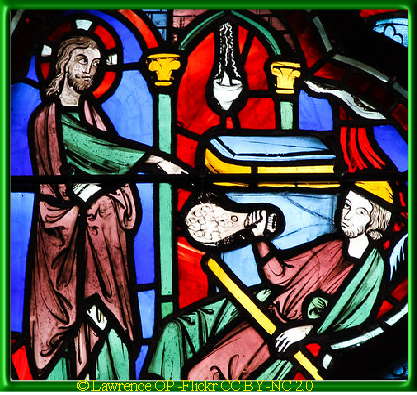31 July 2022
Ecclesiastes 1:2, 2:21-23 Colossians 3:1-5, 9-11 Luke 12:13-21
Theme: Make yourself rich in the sight of God
‘Vanity of vanities, all is vanity’ (Ecc 1:2). This statement from our first reading runs like a refrain through the Book of Ecclesiastes. We could be forgiven for thinking that its author – Qoheleth – must have got out on the wrong side of the bed when he penned that line. Indeed, it seems shocking to find such a pessimistic assessment of human life in the bible. It seems contrary to a healthy and balanced appreciation of earthly realities. Surely the struggle to transform the world by the work of our hands is, as all our recent Popes have stated, a valuable and essential dimension of human life.
Yet Qoheleth is echoing a common human experience of disillusionment with life. Many of you will be familiar with the poignant words of ‘Don’t Cry for me Argentina’ from the movie, Evita. This song expresses Eva Peron’s awareness of the emptiness of all the glamour and excess her privileged life had brought her: ‘And as for fortune, and as for fame/I never invited them in./They are illusions; they’re not the solutions they promised to be’. The poet W.B. Yeats offers a similarly sober reflection on life in the dystopian epitaph he composed for his gravestone in Drumcliffe: ‘Cast a cold eye/On life. On death/Horseman pass by’. The brevity of life and the certainty of death disclose the futility of much human striving for success. As the psalmist reminds us: ‘We take nothing with us when we die. Our wealth does not follow us into the grave’ (Ps 49:17).
Qoheleth’s bleak philosophy of life is certainly an antidote to the naïve optimism of those who believe that things will always turn out for the best. It also raises the question about the ultimate meaning of human life. Is there any enduring value or purpose that is worth striving for? In the words of Patrick Kavanagh, can we find ‘Something not sold for a penny/ In the slums of Mind’. This is a question and a quest to which Qoheleth does not provide a final answer. But there is an answer – the answer Jesus gives us in today’s gospel from Luke, namely to ‘make [ourselves] rich in the sight of God’ (Lk 12:21). That is the only goal worthy of our time and effort.
Jesus answer comes in response to a request to arbitrate a family dispute about inheritance which he refuses to do. Instead he issues the following warning against greed which he then illustrates with a parable about a rich farmer who decides to erect bigger barns to store his bumper crop. Unfortunately, the horseman of death pays him a call before he is able to enjoy the fruits of his labours. Jesus is not condemning industry and hard work – which are lauded in the parable of the talents – but rather greed and selfishness. The rich farmer is concerned only with himself and his desires: ‘What am I to do… I will pull down my barns and build bigger ones, and store all my grain and my goods in them’ (Lk 17-18). Neither God nor neighbour enter into his calculations.
The parable of the rich, but foolish, farmer illustrates the fundamental flaw in the model of economic development at the heart of liberal capitalism. It’s motto is that ‘greed is good’; its catchwords are ‘more’, ‘bigger’ and ‘better’. It is fuelled by the relentless pursuit of wealth, even at the cost of destroying the beautiful planet we inhabit. The recent crisis in the golfing world, with several famous golfers abandoning their the PGA tour for the more lucrative LIV golf series, funded by Saudi Arabia, is just one instance of the cult of the golden calf which continues to thrive in our consumerist culture. This reminds me of the story about a schoolteacher teaching bible lessons to a class of ten year old boys. She asks the class: ‘Why do you think the children of Israel made a golden calf?’ After a few moments of silence, one boy puts up this hand and says, ‘Please Miss, it was because they didn’t have enough gold to make a cow’.
But how do we become rich in the sight of God and resist the blandishments of the advertising industry? Our second reading today from St Paul’s Letter to the Colossians points out the way: ‘You must look for the things that are in heaven, where Christ is’ (Col 3:1). These things are the counter-cultural values of love of God, service of others, especially the poor, and respect for creation. The God of Jesus Christ is a God who sides with the poor and marginalised; he is the God who, in the words of the Magnificat, ‘fills the hungry with good things and sends the rich away empty’ (Lk 1:53). Becoming rich in the sight of God is not something we can achieve quickly or easily. It requires us to reflect seriously and often on the life and death of Jesus and to follow his example of self-giving love. It requires, above all, openness to his Spirit. So let us, in response to the challenge of today’s readings, take to heart the words of Jimmy Mc Carthy’s haunting song, One Bright Blue Rose (a lovely symbol for Christ): ‘And it is a holy thing/And it is a precious time/And it is the only way…/It’s always been and so it goes/To ponder his death/And his life eternally.’
Fr Michael McCabe SMA, Cork, July 2022
To listen to an alternative Homily from Fr Tom Casey of the SMA Media Centre, Ndola, Zambia please click on the play button below.
|
|

